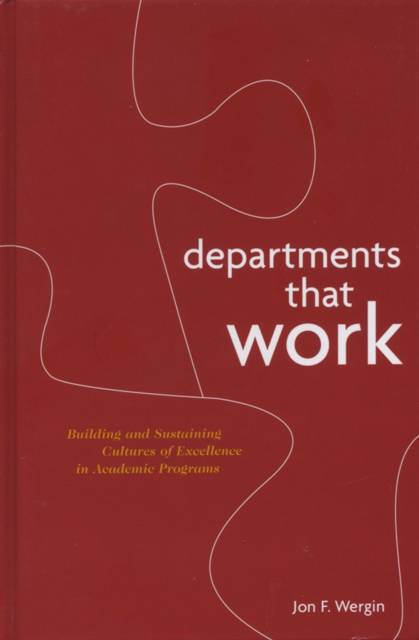
Bedankt voor het vertrouwen het afgelopen jaar! Om jou te bedanken bieden we GRATIS verzending (in België) aan op alles gedurende de hele maand januari.
- Afhalen na 1 uur in een winkel met voorraad
- In januari gratis thuislevering in België
- Ruim aanbod met 7 miljoen producten
Bedankt voor het vertrouwen het afgelopen jaar! Om jou te bedanken bieden we GRATIS verzending (in België) aan op alles gedurende de hele maand januari.
- Afhalen na 1 uur in een winkel met voorraad
- In januari gratis thuislevering in België
- Ruim aanbod met 7 miljoen producten
Zoeken
Departments That Work
Building and Sustaining Cultures of Excellence in Academic Programs
Jon F Wergin
€ 59,95
+ 119 punten
Omschrijving
Evaluation in departments is widespread but often fails to spark positive change. Based on his extensive work with academic departments across the country, Wergin explains that successful department evaluation exists only when faculty and departments have a strong influence on the purposes, processes, and methods of evaluation. The central purpose of Departments That Work is how academic programs can make evaluation more useful and critical reflection more likely.
Topics include:
* How quality has become confused with such concepts as effectiveness, productivity, and marketability and how it might more constructively be conceived as focusing on the engagement of the department with its constituencies
* An examination of both intrinsic and extrinsic motivators of faculty work, the concept of organizational motivation, and the factors influencing identification with the institution and motivation to contribute to it
* The three critical factors of effective department evaluation
* How academic leaders can create a culture of engagement
* How to define and negotiate academic values with diverse stakeholders
* How to ask the right questions and collect the right idea
* How to determine standards and make meaning of evaluation data
* An overall summary of specific recommendations for academic leaders and departmental faculty, including an appendix of the constructs presented in each chapter
Topics include:
* How quality has become confused with such concepts as effectiveness, productivity, and marketability and how it might more constructively be conceived as focusing on the engagement of the department with its constituencies
* An examination of both intrinsic and extrinsic motivators of faculty work, the concept of organizational motivation, and the factors influencing identification with the institution and motivation to contribute to it
* The three critical factors of effective department evaluation
* How academic leaders can create a culture of engagement
* How to define and negotiate academic values with diverse stakeholders
* How to ask the right questions and collect the right idea
* How to determine standards and make meaning of evaluation data
* An overall summary of specific recommendations for academic leaders and departmental faculty, including an appendix of the constructs presented in each chapter
Specificaties
Betrokkenen
- Auteur(s):
- Uitgeverij:
Inhoud
- Aantal bladzijden:
- 176
- Taal:
- Engels
- Reeks:
- Reeksnummer:
- nr. 32
Eigenschappen
- Productcode (EAN):
- 9781882982578
- Verschijningsdatum:
- 1/05/2007
- Uitvoering:
- Hardcover
- Formaat:
- Genaaid
- Afmetingen:
- 157 mm x 231 mm
- Gewicht:
- 408 g

Alleen bij Standaard Boekhandel
+ 119 punten op je klantenkaart van Standaard Boekhandel
Beoordelingen
We publiceren alleen reviews die voldoen aan de voorwaarden voor reviews. Bekijk onze voorwaarden voor reviews.









